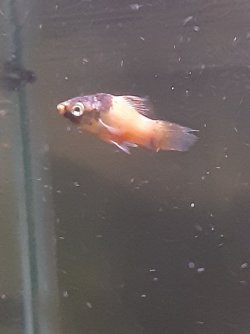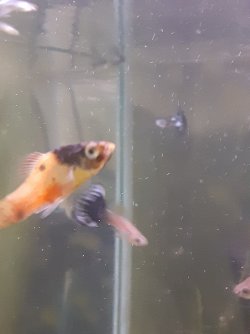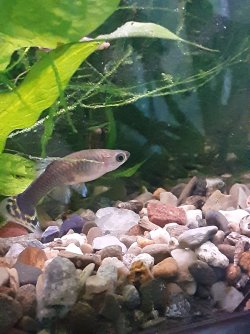Hi! So I used to have this big tropical fish tank filled with guppies, cories, danios, etc. But for some reason, every month or so one fish would randomly start wasting away. They would rapidly loose weight even while eating, their heads would look strange (like they were sticking out), ant their backs would bend inwards. No matter what meds I used, nothing worked. So about three months ago I cleared the whole tank out (there were very few fish left), and put them in their own quarantine tank. I cleaned the big tank out, but re-used the gravel, decorations, plants, and snails. But now I'm noticing the EXACT same illness occurring in my fresh batch of fish! In three months over 10 have mysteriously died. There was no ick, no rot, no parasites (I treated them for it), and the water quality was just fine. Constant water changes, constant medication, but one would just randomly waste away and then another and another. So my last possible thought is: Could this be TB? Could it have been passed through the decorations? Please tell me if you know what this could be, so I know if I have to start all over again with new everything (ugh). Thank you!
You are using an out of date browser. It may not display this or other websites correctly.
You should upgrade or use an alternative browser.
You should upgrade or use an alternative browser.
Fish TB?
- Thread starter ZZ Mak
- Start date
They eat normally, I can't really see their poo but everybody else is just fine. No symptoms, perfectly healthy, just one or two (and some fry) who show symptoms. After they start wasting they can last for days, sometimes even weeks. It's like they progressively get worse, and some last longer than others. I have some pics of the molly and guppy who have it right now. The male is almost paper thin (don't know if you can tell in the pic) and his stomach is slightly caved in. The guppy female is earlier on in the sickness, only a few days. She's loosing weight rapidly, her spine is starting to curve (which happens often)


 e.
e.


 e.
e.Sorry about your fish, it's so frustrating when something like this happens.
What wormers have you used on them?
What wormers have you used on them?
Not quite sure. I've tried several different ones over the years (because it's always this same illness that circulates). None of them ever worked. I just treated them about a two weeks ago and misplaced the bottle, but it was almost empty so I never bothered to find it. I'm pretty sure it was an all-rounder (treated different parasites and various worms).
What have you tried treating them with?
What species of fish are in the tank?
Do you have any pictures of the fish with the black head before it became unwell?
--------------------
They look like they have a protozoan infection and possibly a microsporidian infection.
I would try salt.
You can add rock salt (often sold as aquarium salt), sea salt or swimming pool salt to the aquarium at the dose rate of 2 heaped tablespoon per 20 litres of water.
If you only have livebearers (guppies, platies, swordtails, mollies), goldfish or rainbowfish in the tank you can double that dose rate, so you would add 4 heaped tablespoons per 20 litres.
Keep the salt level like this for at least 2 weeks but no longer than 4 weeks otherwise kidney damage can occur. Kidney damage is more likely to occur in fish from soft water (tetras, Corydoras, angelfish, gouramis, loaches) that are exposed to high levels of salt for an extended period of time, and is not an issue with livebearers, rainbowfish or other salt tolerant species.
The salt will not affect the beneficial filter bacteria but the higher dose rate (4 heaped tablespoons per 20 litres) will affect some plants and some snails. The lower dose rate will not affect plants, shrimp or snails.
After you use salt and the fish have recovered, you do a 10% water change each day for a week using only fresh water that has been dechlorinated. Then do a 20% water change each day for a week. Then you can do bigger water changes after that. This dilutes the salt out of the tank slowly so it doesn't harm the fish.
If you do water changes while using salt, you need to treat the new water with salt before adding it to the tank. This will keep the salt level stable in the tank and minimise stress on the fish.
What species of fish are in the tank?
Do you have any pictures of the fish with the black head before it became unwell?
--------------------
They look like they have a protozoan infection and possibly a microsporidian infection.
I would try salt.
You can add rock salt (often sold as aquarium salt), sea salt or swimming pool salt to the aquarium at the dose rate of 2 heaped tablespoon per 20 litres of water.
If you only have livebearers (guppies, platies, swordtails, mollies), goldfish or rainbowfish in the tank you can double that dose rate, so you would add 4 heaped tablespoons per 20 litres.
Keep the salt level like this for at least 2 weeks but no longer than 4 weeks otherwise kidney damage can occur. Kidney damage is more likely to occur in fish from soft water (tetras, Corydoras, angelfish, gouramis, loaches) that are exposed to high levels of salt for an extended period of time, and is not an issue with livebearers, rainbowfish or other salt tolerant species.
The salt will not affect the beneficial filter bacteria but the higher dose rate (4 heaped tablespoons per 20 litres) will affect some plants and some snails. The lower dose rate will not affect plants, shrimp or snails.
After you use salt and the fish have recovered, you do a 10% water change each day for a week using only fresh water that has been dechlorinated. Then do a 20% water change each day for a week. Then you can do bigger water changes after that. This dilutes the salt out of the tank slowly so it doesn't harm the fish.
If you do water changes while using salt, you need to treat the new water with salt before adding it to the tank. This will keep the salt level stable in the tank and minimise stress on the fish.
I don't think so. The spine isn't bent enough and there aren't any lesions.I disagree, I think it is fish TB.
Stargazee
New Member
- Joined
- May 29, 2019
- Messages
- 46
- Reaction score
- 3
Could you possibly take a look at my fish and let me know if you think mine have TB or something else? I thought mine had it but now perhaps not.I don't think so. The spine isn't bent enough and there aren't any lesions.
Sure why don't you make a thread and we will take a lookCould you possibly take a look at my fish and let me know if you think mine have TB or something else? I thought mine had it but now perhaps not.
Stargazee
New Member
- Joined
- May 29, 2019
- Messages
- 46
- Reaction score
- 3
Yes posting now.Could you possibly take a look at my fish and let me know if you think mine have TB or something else? I thought mine had it but now perhaps not.
Similar threads
- Replies
- 53
- Views
- 1K
- Replies
- 11
- Views
- 453
- Replies
- 23
- Views
- 660
- Replies
- 7
- Views
- 247

